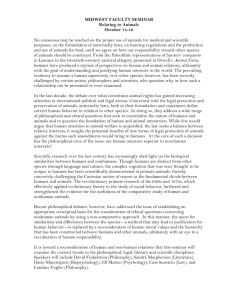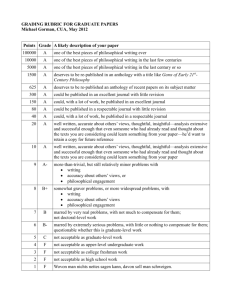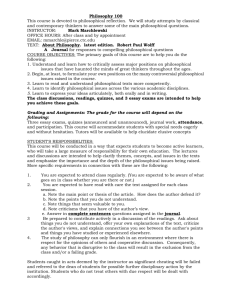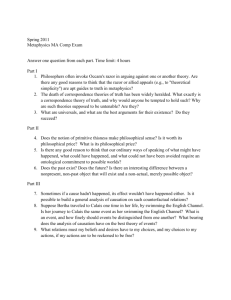EXAM 1 STUDY GUIDE – History & Philosophy of Science
advertisement
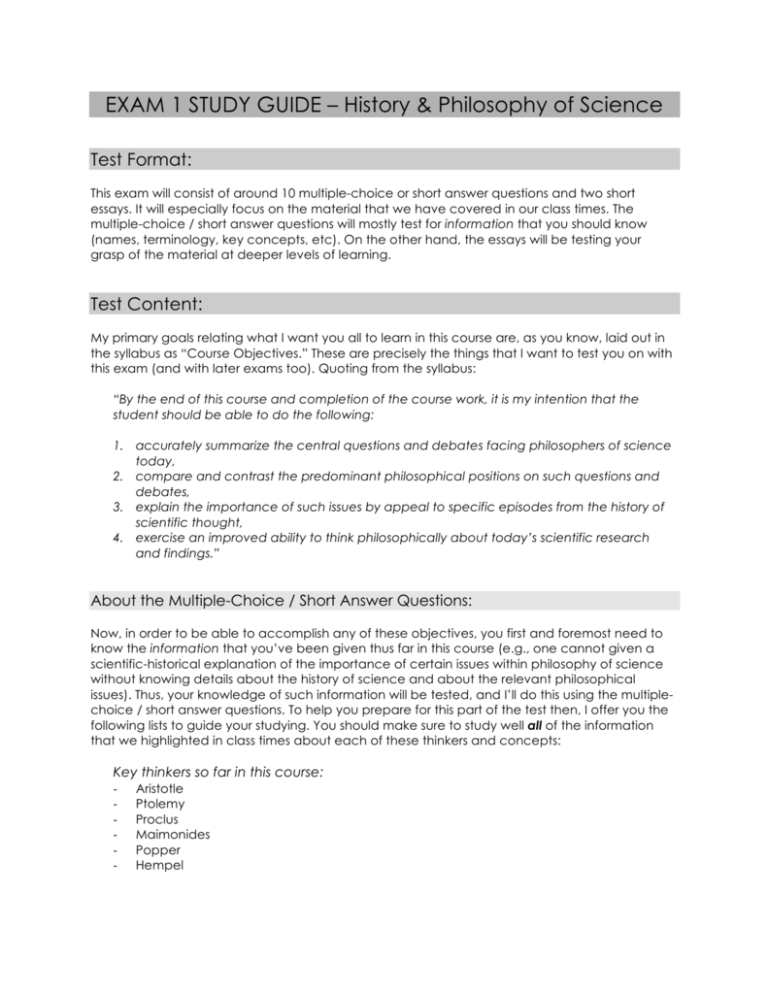
EXAM 1 STUDY GUIDE – History & Philosophy of Science Test Format: This exam will consist of around 10 multiple-choice or short answer questions and two short essays. It will especially focus on the material that we have covered in our class times. The multiple-choice / short answer questions will mostly test for information that you should know (names, terminology, key concepts, etc). On the other hand, the essays will be testing your grasp of the material at deeper levels of learning. Test Content: My primary goals relating what I want you all to learn in this course are, as you know, laid out in the syllabus as “Course Objectives.” These are precisely the things that I want to test you on with this exam (and with later exams too). Quoting from the syllabus: “By the end of this course and completion of the course work, it is my intention that the student should be able to do the following: 1. accurately summarize the central questions and debates facing philosophers of science today, 2. compare and contrast the predominant philosophical positions on such questions and debates, 3. explain the importance of such issues by appeal to specific episodes from the history of scientific thought, 4. exercise an improved ability to think philosophically about today’s scientific research and findings.” About the Multiple-Choice / Short Answer Questions: Now, in order to be able to accomplish any of these objectives, you first and foremost need to know the information that you’ve been given thus far in this course (e.g., one cannot given a scientific-historical explanation of the importance of certain issues within philosophy of science without knowing details about the history of science and about the relevant philosophical issues). Thus, your knowledge of such information will be tested, and I’ll do this using the multiplechoice / short answer questions. To help you prepare for this part of the test then, I offer you the following lists to guide your studying. You should make sure to study well all of the information that we highlighted in class times about each of these thinkers and concepts: Key thinkers so far in this course: -­‐ -­‐ -­‐ -­‐ -­‐ -­‐ Aristotle Ptolemy Proclus Maimonides Popper Hempel Key concepts from this course so far: -­‐ -­‐ -­‐ -­‐ -­‐ -­‐ -­‐ -­‐ Demarcation Problem o Falsifiability o Conjecture & refutation Philosophical Analysis o Characteristics of a great analysis / definition o necessary and sufficient conditions o counterexamples: tests for necessity and sufficiency, too strong / too weak explanation o explanans o explanandum o explanatory relation o Deductive-Nomological account of explanation and criticisms o Flagpole and birth control examples o causal account of explanation and criticisms a priori and a posteriori arguments o as opposed to a priori and a posteriori knowledge confirmation / disconfirmation o Hypothetico-Deductive account of confirmation o Irrelevant conjunction o Auxiliary hypotheses Aristotle o Dynamics o Natural motion o Forced motion o Simple bodies o Compound bodies o Argument against the possibility of a void o Telos o Teleology o Nature and things derived from nature o Four causes o “man generates man” o Scientific method and knowledge o Arguments for the position, shape, relative size, stability of the earth Ptolemy o Arguments for the position, shape, relative size, stability of the earth o Astronomy o Characteristics and perceived motions of the heavenly bodies o Retrograde motion o Epicycles (and epi-epicycles) o Deferent o Eccentric o Equant point o Prediction versus explanation Proclus / Maimonides o Challenges to Ptolemaic astronomy o Realism / instrumentalism and the aims of a scientific theory About the Short Essays There is not much to say here in the way of specific advice. These essays are meant to gauge more directly whether or not you are accomplishing the course objectives. Beyond that, I don’t want to give you too much information about what I will test you on ahead of time. To test your abilities on objectives 1 and 2, I will ask you to do more than just restate the information that you have learned about particular issues in the philosophy of science and various positions philosophers have taken regarding them. I will ask you to take this information and apply it in ways that show me that you have an understanding of the material that is deep enough to allow you to make interesting comparisons and contrasts between philosophical theories. I will want you to display a similar richness of understanding with regards to objective 3. I won’t ask you simply to regurgitate information here about episodes in the history of science. Instead, I want to see that you are thinking hard about the issues of this course; I want to test the extent to which you are relating the philosophical material of this course to the historical material. And I want to test whether you are able to see the relevance of our philosophical issues to scientific practice. Objective 4 is perhaps the most important of the goals of this course. But it is also the most difficult to test. While I won’t worry about testing your ability here for now, this may come up on future tests. And, ultimately, the hope is that, if you are able to accomplish objectives 1-3, then you will be able to accomplish objective 4 as well!




